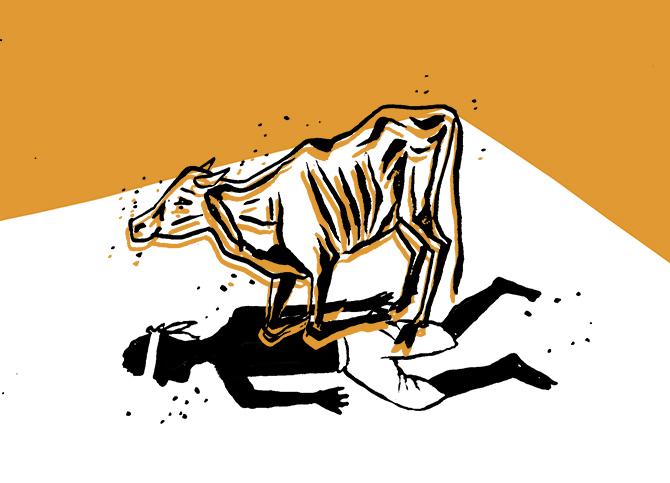In the run-up to the 2019 election, netas of all hues are reiterating their devotion for all things bovine, says Geetanjali Krishna.
Illustration: Dominic Xavier/Rediff.com

The Babri Masjid is on my mind as I write this column. On December 6, 1992, when the Masjid fell to a horde of Hindu right-wingers, I'd never imagined that the Hindutva brigade's myth, that the largest numerical and power majority in India is somehow threatened by minority religions, would gain the force that it has today.
Or that cow love would reach the fever pitch that it has today.
In the run-up to the 2019 general election, netas of all hues are reiterating their devotion for all things bovine. It is when one travels to Indian villages that one can understand the impact of all this.
Recently in Mirzapur, we drove to one of the many streams that dot its landscape to watch the sunset. Enveloped in a forest, this once used to be a favourite picnic spot. That day, however, an overpowering stench of rotting flesh made it impossible to even stand close to the water.
Suddenly, I heard a rustle from a nearby bush. It was an emaciated cow, too weak to even stand. Not far from it was a pile of bones, picked clean.
I realised that this was perhaps one of the several places in the countryside where farmers left their sick and ageing cows to die.
Of course this was terrible and heart-rending from an animal rights perspective. But I chatted with a local farmer for another perspective.
"I have six cows which my school-going son takes to the hills nearby to graze," he said. "For all that we expend in energy and money to keep them, they give barely a couple of litres of milk each."
Why then, I asked, did he rear cows anyway?
It was a family tradition and he used to get good prices for their female calves, he said. "At that time, if a cow didn't give much milk, or became sick, farmers like me had other options," he said.
It is common knowledge that until three years ago, farmers, under the radar, of course, would sell cows that stopped producing milk to the local abattoir or tannery. But now, with growing cow vigilantism, this had become impossible.
"It is hard for poor farmers to rear cows now," he said. "Fodder and medicines are expensive, and what's more, cows can live for 20 years after they stop giving milk."
While reiterating that he, of course, would never abandon his animals, he said he could well understand why others would do so.
"But they do so only when desperate," he whispered. "Everyone fears reprisals from the gau-bhakts, cow devotees..."
Which is why it didn't surprise me at all to learn that thousands of deserted cattle die each year in Uttar Pradesh.
Local farmers complain that these animals have turned into agricultural pests as they forage in fields to survive.
Most, however, aren't lucky enough to feed in a field -- they dine off rubbish heaps and often die after ingesting plastic and other toxics.
"It pains me to see these animals," said the farmer. "But often for people like me, it is a choice between feeding the animal or feeding one's own children..."
Back at that waterfall, I looked sadly at the dying cow. It was the first time I'd seen a creature dying because the government had loved it too much.












 © 2025
© 2025